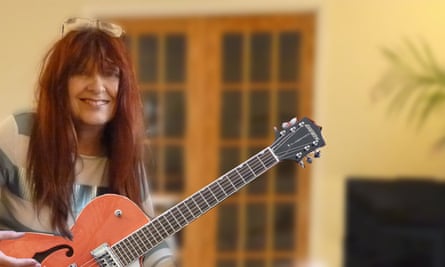The story of the computer hacker Gary McKinnon and his long battle against extradition to the US is to be turned into a feature film.
It will tell the story of how a young man hunting for evidence of UFOs found his way into the Pentagon’s system and carried out what US authorities described as “the biggest military computer hack of all time” and then faced the possibility of a long sentence in a US high-security prison.
The film, The People v Gary McKinnon, will be directed by Paul McGuigan, who made Gangster Number 1 and Lucky Number Slevin. The screenplay is by Peter Harness, who has written scripts for Wallander, Doctor Who, and McMafia as well as the film Is Anybody There? starring Michael Caine. It will be produced by Wall to Wall Media, a Warner Bros Discovery company.

“It’s great news,” said Janis Sharp, McKinnon’s mother, who led the decade-long campaign to halt the extradition and whose book Saving Gary McKinnon: A Mother’s Story is the basis of the film. “Everyone had told us we would never win so it’s an important story from that point of view to encourage others to keep fighting.”
McKinnon found his way into the computer systems of the US defence department and Nasa in 2001 in an eccentric search for evidence of UFOs. During the course of his trespass, conducted from a bedroom in a north London flat, he left messages including one that read “Your security system is crap”. He was arrested in London in 2002 and held briefly in Brixton prison. He would have agreed to plead guilty to computer misuse offences in the UK but was pursued by US authorities to stand trial there, with one district attorney saying he would like to “see him fry”.
The extradition request was finally granted in 2006. After McKinnon appeared on television, specialists in autism realised that he had Asperger syndrome. Prof Simon Baron Cohen, a clinical psychologist, concluded that if McKinnon was extradited “there is a risk that he would take his own life”.
Labour home secretaries declined to intervene despite pressure from backbench MPs on both sides of the house. “Some of Labour was terrible,” Sharp said of her experience trying to persuade the then home secretary, Alan Johnson, to halt the process. “But Gordon Brown did ask Hillary Clinton to help us and Michael Meacher was very good, too.” It was not until 2012 that the then home secretary, Theresa May, intervened. “She was the only one who had the guts to stand up to the Americans.”
May said at the time: “After careful consideration of all of the relevant material, I have concluded that Mr McKinnon’s extradition would give rise to such a high risk of him ending his life that a decision to extradite would be incompatible with Mr McKinnon’s human rights.”
She referred the matter to the then director of public prosecutions, Keir Starmer, to decide whether McKinnon should be prosecuted for computer offences in the UK. Two months later, the decision was made not to prosecute because of the many security difficulties involved and the lapse of time. “The prospects of a conviction against Mr McKinnon … are not high,” Starmer said in announcing the decision.

Casting for the film is under way and shooting is due to start in the spring. McKinnon, now 57, runs a small search engine optimisation company and lives in Leicester with his longtime girlfriend, Lucy Clarke. He also plays, composes and records music.
News of the upcoming film coincides by chance with the international re-release of Sharp’s own music from the 1980s, which Reminder Records in New York has put out as a vinyl album, Heroes of the Night, described as a chance to “showcase the talents of post-punk’s female musical innovators and pioneers”.
McKinnon and Sharp have been active in the ongoing campaign to halt another extradition process – that of Julian Assange – and she welcomes the chance to draw parallels between the cases.
“It is horrendous what is going on with Julian,” she said. “[Barack] Obama has already pardoned the person [Chelsea Manning] who released the information in the first place and yet Julian has been kept in Belmarsh prison [since April 2019]. It is inhumane, a form of mental torture. Let’s hope that someone will have the guts to stand up for him and his family and give his young children their father back for Christmas. Now wouldn’t that be something?”









